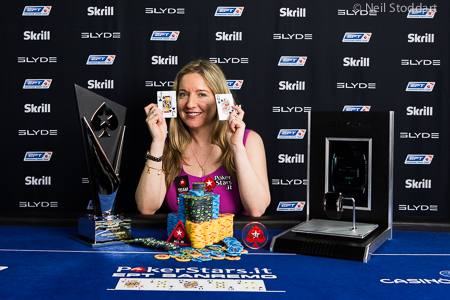
The final table at the PokerStars/Hippodrome Winter Classic tournament.
On Sunday I came seventh in the PokerStars Live at the Hippodrome Winter Classic tournament for £1,600. Not as good as last year’s, in which I came third for £5,250, but I’m prouder of this result, because I really made the best of some marginal hands.
It was a two-day tournament, so I should by rights have been dealt every possible starting hand: Aces at least once (they should come every eight hours or so), AK three times. But no – my best pocket pair was Kings, just once, and the next best tens, just once. My highest Ace was AQ, just once.
So how did I go deep? This is the kind of creative play I’ve learned from playing cash at the PokerStars Live Lounge at the Hippodrome – I’m sharing in the hope that poker-playing readers will pick up some strategy tips:
- Sniffing out a bluff
I have 78 of clubs. The blinds are still low (500 on a starting stack of 25k), so I can afford to call a 1.5k raise. We’re four-handed when a scare flop comes 99Q with two spades and a diamond. Nothing there for me. It’s checked round. The turn is an 8, bringing a second diamond, and a pair for me. We all check to the initial button raiser, who bets 5k. The others fold, and I call with my bottom pair.
This is where it gets interesting. When I check the river of a 5 of diamonds, hoping I’ll be ahead on the showdown with my humble pair but knowing he may well have a pair of Queens, a higher pocket pair or even slow-played trips, the raiser makes it 12.5k.
Some people would fold automatically, but instead I think it through. The 5 of diamonds is actually a key card here, because it completes a backdoor flush and a 5-9 straight: both are hands I might have been drawing to when I called the turn. If he has a pair, or even if he was slow-playing trip 9s, there’s no way he’d value-bet that river. Why bet when he’s only getting called by a bigger hand? So he either has a monster – a house or at minimum a backdoor flush – or else he’s bluffing.
That’s what they call a “polarised” range. From listening to the guy talking to his neighbour, I know he’s a pro; therefore he is capable of bluffing for pretty nearly his whole stack. And he doesn’t “feel” strong.
If I call and get it wrong, I’m down to 7k – crippled. But if I get it right, I’ve nearly doubled up. I make the call. He had KJ for a failed gutshot, and the whole table gasps when I show just a pair of 8s.
Your take-home: if they are a pro player and you put them on a failed draw, you can call a river bet with a small pair. I’ve even done so with Queen high.
- Turning a draw into a bluff
I make one bluff early on when I float a tiny flop bet with air and a third suited card comes on the turn. I’ve been playing tight, so when I bet it, both players fold. Easy stuff. But there’s a more interesting bluff, as it relies strongly on a read:
I have Q8 of clubs in the small blind. There’s one limp, I call, and the big blind checks. The flop comes Ace high, with two clubs for a flush draw. So of course I bet. The big blind calls.
The turn is a second Ace. I bet again. The big blind calls again. Weird. What’s he calling with? The flush draw maybe? In that case, mine is bigger. Has he hit a small pair? What gives me strength is that I know for sure he hasn’t got an Ace. And I know this, even though he has only just sat down at the table, simply because he has a card protector in front of him that says “Online Turbo Tournament Champion”. There is no way in hell that a guy like that with any kind of Ace in the big blind would not have raised pre-flop.
Yet another Ace comes on the river. Three Aces on the board! Any kind of pair now has made a house. Any Ace has now got quads. I only have Q high. I may even be ahead, though I still need to push him off a possible small pair. I bet convincingly small, less than half the pot. He folds, and everyone congratulates me on my “quad Aces”. The big blind later admitted he was calling with 8 high, intending to bluff me later, but you can’t bluff a man who so obviously “has” quads!
Your take-home: Conversely, you can easily turn your own failed draw into a bluff, if you have a read that your opponent is weak.
- Turning bad position into good position
It’s day two of the tournament, and there’s a loose big-stack raising so often that he can’t have a hand each time. That kind of person you have to re-raise, never call. So when he raises my blind to 6.5k and I have AJ, I re-raise to 15k. He calls. Impulsively, I check in the dark. Why? Because he has position over me, and he’s an aggressive player. If I have to make a continuation bet on the flop, he can re-raise if he hits, or fold or float or bluff if he doesn’t, and I won’t know where I am. I want to keep the initiative, and keep him confused. It works. He frowns, baffled and off-balance.
The flop comes King high, all clubs, and he… checks. For all he knows, I have a flush, or AK; even an aggressive player would struggle to bluff that flop in the dark. Blissfully, the turn is a fourth club. I have none of this flop, but it doesn’t matter. Even with no information, I know he is less than 50% to hold a club in his two hole cards (less than 50%, because there are only 9 clubs left out of 46 unknown cards). But I do have information: he checked the all-club flop. Whereas I checked in the dark, so he learned nothing. So I am safe to bet here as though I have a club, and see him fold. That’s just what happens.
Your take-home: If there are four suited cards on the board, make a small river bet. Unless you are known as an aggressive, bluffing player, a bet of half or even a third of the pot gives you a greater than 50% chance of forcing a fold.
- Value-betting and bluffing at the same time
I have KJ unsuited in early position. Not a wonderful tournament hand in early position when the blinds are dangerously high, but one of the best I’ve seen all day, so I raise, and get two callers. The flop comes K high. Good. But when I bet, I get one call. There is a flush draw out there, but it doesn’t “feel” like he has one, it “feels” like he has a King. But what’s his kicker? It ought to be at least KJ, maybe KQ, to call a tight player raising from early position. The turn is a second 3. I check, he bets. I could give up now, but hell, I have top pair with a decent kicker. But I won’t raise, because he’s likely only folding with a worse kicker than mine. So I call. See what happens on the river.
The river is an Ace. Brilliant. If I’m right that he has a King, I can be sure he hasn’t got an Ace. This guy is wearing a baseball cap; he would definitely have re-raised AK pre-flop. So I instantly grasp that I can bet the Ace safely. And the fascinating thing about this bet is that it is at the same time a bluff and a value bet.
It’s a bluff because if he has KQ, I’m losing, and with KJ we’re chopping, but I have a good chance of pushing him off the hand by representing the Ace. It will make total sense to him that I should have one: I raised pre-flop, made a continuation bet on the flop, check-called the turn when he showed strength, and then raised the river when the Ace came. So “of course” I spiked an Ace.
But it’s also a value bet, because if he has K10, or K9, which is possible for a guy wearing a baseball cap especially if they were suited, and he does somehow summon up the courage for a hero call, then I make extra money. He dwells ages, so I know he had some kind of King, before folding, cursing the river.
Your take-home: Always be prepared to change your tactics to adjust to new cards on each street.
- When all else fails, you do need a little luck!
My second best hand in the whole tournament is AQ, shortly after the bubble bursts. So when I finally get it, you’re damn right I re-raise it. Following a bet of 10k and one call, I make it 25k. They both call. The flop comes Queen high, with a 5 and a 4, no flush draw. Hallelujah! I bet 45k, and get one fold, and one very slow call from the shorter stack. He’s either very strong, with trips, and slow-playing it – a real possibility, though at least I can rule out two pairs – or he has a weaker Queen. Hard to tell from the betting action, but it no longer matters: he has only 65k left, with 170k already in the pot. I can’t fold.
So I’m jamming the turn whatever comes (it’s a 2), at which he snap-calls. Yep, he has pocket 5s for trips. Even a third Queen won’t help me, as it would give him a house. I’ll still have 100k left from the stack I’ve painstakingly built, but this sucks. And just then… a genuine miracle from the Poker Gods. The river is a 3, giving me a runner-runner straight.
I like to think this is karmic payback for my bad starting hands this weekend, or for all the times my Aces have been cracked by Kings or Queens in tournaments past. But really, it’s just the glorious, infuriating, crazy, random thing about poker. You can concentrate hard and make great reads and play your best game, but you’ll usually need some shot of dumb good luck, somewhere along the line, to reach the final table. It’s why we love poker and get furious with poker but keep coming back to it: it’s unpredictable and ever-changeable, with no two hands the same.
And what did I do to celebrate my eventual £1,600 final-table win, you might ask?
Well duh. I went straight back up to the PokerStars Live Lounge balcony to play for cash.
Tags: bluff, cash play, final table, Hippodrome, hold 'em, poker, PokerStars Live, read, starting hand, strategy, tips, tournament, Winter Classic













